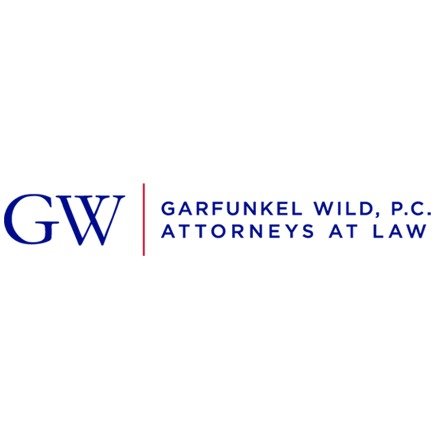Best Corporate & Commercial Lawyers in New York
Share your needs with us, get contacted by law firms.
Free. Takes 2 min.
Or refine your search by selecting a city:
List of the best lawyers in New York, United States
United States Corporate & Commercial Legal Articles
Browse our 1 legal article about Corporate & Commercial in United States written by expert lawyers.
- United States NY LLC Transparency Act 2026 Compliance Guide
- The federal Corporate Transparency Act (CTA) and New York's LLC Transparency Act are separate regimes: reporting to FinCEN does not satisfy New York's 2026 state filing requirement. Most small corporations and LLCs in the United States must file Beneficial Ownership Information (BOI) with FinCEN starting 2024, unless a specific federal... Read more →
About Corporate & Commercial Law in New York, United States
Corporate and commercial law in New York refers to the body of laws and regulations that govern how businesses are formed, operated, managed, bought, sold, and dissolved in the state. New York is a major financial and commercial hub, which means its legal framework for business is especially robust and comprehensive. This area of law includes everything from setting up corporations and limited liability companies (LLCs), to contract negotiation, mergers and acquisitions, regulatory compliance, and dispute resolution. The legal landscape is influenced by both state and federal laws, along with the influential practices of the New York State courts, especially in Manhattan, which often set precedents for business cases nationwide.
Why You May Need a Lawyer
The field of corporate and commercial law is complex, with significant risks and high stakes for businesses of all sizes. Here are common situations where you might need legal assistance:
- Starting or forming a business entity, including choosing between incorporation, forming an LLC, or other structures
- Drafting, reviewing, or negotiating business contracts, leases, and agreements
- Navigating mergers, acquisitions, or the sale of a business
- Managing compliance with local, state, and federal regulations
- Resolving shareholder or partnership disputes
- Handling employment law matters like hiring, firing, or employee complaints
- Protecting intellectual property such as trademarks, copyrights, and patents
- Coping with financial distress, bankruptcy, or debt restructuring
- Managing day-to-day transactions, commercial leasing, and supply chain agreements
- Preparing for litigation or defending against lawsuits
Local Laws Overview
New York business entities are primarily governed by state statutes such as the New York Business Corporation Law (BCL), Limited Liability Company Law (LLCL), and Partnership Law. Some key aspects include:
- Formation and Structure: Strict requirements for corporate charters and operating agreements. Foreign entities must register to do business in New York.
- Business Contracts: New York law tends to enforce written contract terms as drafted, but has specific requirements for certain transactions (such as the Statute of Frauds).
- Employment: Strong state and city employment laws supplementing federal protections, such as wage and hour rules, anti-harassment policies, and human rights laws.
- Securities: State securities regulations can impact private offerings and investments in addition to federal SEC rules.
- Litigation: Commercial disputes may be heard in the dedicated Commercial Division of the New York Supreme Court, which is respected for its expertise and efficiency.
- Compliance: Businesses must comply with state and local tax laws, environmental regulations, consumer protection statutes, and industry-specific rules.
Frequently Asked Questions
What business structures are available in New York?
Common options include corporations, limited liability companies (LLCs), limited partnerships (LPs), general partnerships, and sole proprietorships. Your choice will impact taxes, liability, and management structure.
How do I register a business in New York?
Corporations and LLCs are registered with the New York Department of State. You must file a Certificate of Incorporation (for corporations) or Articles of Organization (for LLCs), and pay the required fee. Some businesses may need additional permits or licenses based on their industry or location.
Do I need a written agreement for my business?
While it is not always legally required, having a written operating agreement, partnership agreement, or shareholder agreement is highly recommended to clarify the rights and obligations of all parties involved.
What is the Commercial Division of the New York Supreme Court?
The Commercial Division is a specialized court within the New York State Supreme Court that handles complex business and commercial disputes efficiently. It is well-regarded among attorneys and businesses for its expertise.
How are contracts enforced in New York?
New York generally honors the terms of written contracts as drafted, as long as they are not unconscionable or illegal. Oral contracts can be enforceable in some cases, but certain transactions require written agreements under the Statute of Frauds.
What are my compliance obligations as a New York business?
At a minimum, you must comply with state and local tax rules, business licensing requirements, employment laws, environmental and zoning regulations, and any industry-specific standards.
Can I resolve business disputes without going to court?
Yes, many commercial contracts include arbitration or mediation clauses. Even without such provisions, parties often resolve disputes through settlement negotiations or alternative dispute resolution methods.
What are my responsibilities as a corporate officer or director?
You owe fiduciary duties of care and loyalty to the corporation and its shareholders. This includes acting in the company’s best interests and avoiding conflicts of interest.
How are small business owners protected from liability?
Entities like corporations and LLCs provide limited liability, which means that owners’ personal assets generally cannot be used to pay business debts, except in cases of fraud or failure to follow legal formalities.
Do New York businesses have to follow federal laws?
Yes, businesses must comply with all applicable federal laws, such as tax laws, employment regulations, and securities statutes, in addition to New York state and local requirements.
Additional Resources
If you are seeking more information about corporate and commercial law in New York, consider contacting these organizations or consulting these resources:
- New York State Department of State, Division of Corporations
- New York State Unified Court System - Commercial Division
- New York City Department of Consumer and Worker Protection
- New York State Bar Association - Business Law Section
- United States Small Business Administration (SBA) - New York District Office
- SCORE New York City (business mentoring and legal resources for entrepreneurs)
Next Steps
If you believe you need legal assistance in corporate and commercial law, here are some recommended steps:
- Identify your main issue or concern, whether it is business formation, contract drafting, or resolving a dispute
- Collect all related documents or records to assist your attorney in assessing your case
- Seek a qualified attorney who specializes in corporate and commercial law in New York. The New York State Bar Association can provide referrals
- Schedule an initial consultation to discuss your needs, possible solutions, and legal fees
- Ask questions to make sure you fully understand your rights, obligations, and the potential outcomes
- Stay proactive with compliance and seek ongoing legal advice as your business grows to avoid costly mistakes
Taking these steps will help protect your interests and ensure that your business operates smoothly in New York’s dynamic legal environment.
Lawzana helps you find the best lawyers and law firms in New York through a curated and pre-screened list of qualified legal professionals. Our platform offers rankings and detailed profiles of attorneys and law firms, allowing you to compare based on practice areas, including Corporate & Commercial, experience, and client feedback.
Each profile includes a description of the firm's areas of practice, client reviews, team members and partners, year of establishment, spoken languages, office locations, contact information, social media presence, and any published articles or resources. Most firms on our platform speak English and are experienced in both local and international legal matters.
Get a quote from top-rated law firms in New York, United States — quickly, securely, and without unnecessary hassle.
Disclaimer:
The information provided on this page is for general informational purposes only and does not constitute legal advice. While we strive to ensure the accuracy and relevance of the content, legal information may change over time, and interpretations of the law can vary. You should always consult with a qualified legal professional for advice specific to your situation.
We disclaim all liability for actions taken or not taken based on the content of this page. If you believe any information is incorrect or outdated, please contact us, and we will review and update it where appropriate.
Browse corporate & commercial law firms by service in New York, United States
New York, United States Attorneys in related practice areas.
Browse corporate & commercial law firms by city in New York
Refine your search by selecting a city.

















